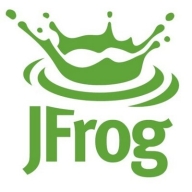


Red Hat Advanced Cluster Security for Kubernetes and JFrog Xray offer robust security and vulnerability management solutions for containerized environments. Red Hat Advanced Cluster Security for Kubernetes emerges as a slightly more favored product in deployment and customer service, while JFrog Xray stands superior in features.
Features: Red Hat Advanced Cluster Security for Kubernetes is praised for its integration and compliance checks, role-based access control, and network segmentation. JFrog Xray receives positive feedback for its extensive vulnerability database, automation capabilities, and artifact scanning. However, JFrog Xray's feature set is considered more comprehensive, giving it an edge.
Room for Improvement: Red Hat Advanced Cluster Security for Kubernetes users highlight the need for better documentation, more streamlined configuration processes, and enhanced threat detection. Conversely, JFrog Xray's users indicate a desire for improved scalability, performance enhancements, and better user interface design. JFrog Xray's suggestions are more technical, whereas Red Hat's involve user experience.
Ease of Deployment and Customer Service: Red Hat Advanced Cluster Security for Kubernetes receives commendations for being relatively easy to deploy with excellent customer service support. JFrog Xray, while slightly more complex to set up, has a solid customer service team that users find helpful. Red Hat's ease of deployment and superior customer service make it a preferred choice for initial setup and support.
Pricing and ROI: Red Hat Advanced Cluster Security for Kubernetes users appreciate the reasonable setup costs and perceive the ROI as favorable given its strong security features. JFrog Xray is seen as more expensive but is considered worth the investment due to its superior feature set and robust security capabilities. Despite higher costs, JFrog Xray offers high ROI, particularly for larger organizations needing extensive security solutions.



SentinelOne Singularity Cloud Security protects cloud workloads, offering advanced threat detection and automated response. It integrates seamlessly with cloud environments and secures containerized applications and virtual machines against vulnerabilities.
SentinelOne Singularity Cloud Security is renowned for its efficiency in mitigating threats in real-time. The platform integrates effortlessly with existing cloud environments, ensuring robust cloud security management with minimal manual intervention. Securing containerized applications and virtual machines, it excels in threat intelligence and endpoint protection. However, improvements are needed in performance during high workload periods, and more integrations with third-party tools and better documentation would be beneficial. Users often find the installation process complex, support response times slow, and the dashboard's navigation unintuitive.
What are the key features of SentinelOne Singularity Cloud Security?In specific industries, SentinelOne Singularity Cloud Security is implemented to safeguard critical data and infrastructure. Organizations in finance, healthcare, and technology depend on its real-time threat detection and automated response to protect sensitive information. Its ability to secure containerized applications and virtual machines is particularly valuable in dynamic environments where rapid scaling is necessary.
JFrog is on a mission to enable continuous updates through Liquid Software, empowering developers to code high-quality applications that securely flow to end-users with zero downtime. The world’s top brands such as Amazon, Facebook, Google, Netflix, Uber, VMware, and Spotify are among the 4500 companies that already depend on JFrog to manage binaries for their mission-critical applications. JFrog is a privately-held, global company, and is a proud sponsor of the Cloud Native Computing Foundation [CNCF].
If you are a team player and you care and you play to WIN, we have just the job you're looking for.
As we say at JFrog: "Once You Leap Forward You Won't Go Back!"
Red Hat Advanced Cluster Security for Kubernetes is a Kubernetes-native container security solution that enables your organization to more securely build, deploy, and run cloud-native applications from anywhere. With its built-in security across the entire software development life cycle, you can lower your operational costs, reduce operational risk, and increase developer productivity while improving your security posture immediately. In addition, Red Hat Advanced Cluster Security integrates with security tools and DevOps in an effort to help you mitigate threats and enforce security policies that minimize operational risk to your applications. It also enables you to provide developers with actionable, context-rich guidelines integrated into existing workflows, along with tooling to support developer productivity. The solution is suitable for small, medium, and large-sized companies.
Red Hat Advanced Cluster Security for Kubernetes Features
Red Hat Advanced Cluster Security for Kubernetes has many valuable key features. Some of the most useful ones include:
Red Hat Advanced Cluster Security for Kubernetes Benefits
There are many benefits to implementing Red Hat Advanced Cluster Security for Kubernetes. Some of the biggest advantages the solution offers include:
Reviews from Real Users
PeerSpot user Igor K., Owner/Full Stack Software Engineer at Maraphonic, Inc., says, “The solution allows teams to create their own virtual spaces and share resources. The most valuable feature is the ability to share resources.”
We monitor all Container Security reviews to prevent fraudulent reviews and keep review quality high. We do not post reviews by company employees or direct competitors. We validate each review for authenticity via cross-reference with LinkedIn, and personal follow-up with the reviewer when necessary.